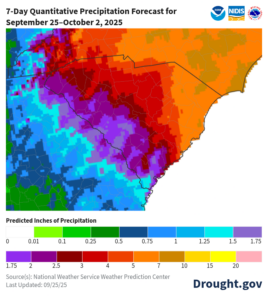Dan Anco Clemson Comments Peanut Notes No. 263 2025
go.ncsu.edu/readext?1095938
en Español / em Português
El inglés es el idioma de control de esta página. En la medida en que haya algún conflicto entre la traducción al inglés y la traducción, el inglés prevalece.
Al hacer clic en el enlace de traducción se activa un servicio de traducción gratuito para convertir la página al español. Al igual que con cualquier traducción por Internet, la conversión no es sensible al contexto y puede que no traduzca el texto en su significado original. NC State Extension no garantiza la exactitud del texto traducido. Por favor, tenga en cuenta que algunas aplicaciones y/o servicios pueden no funcionar como se espera cuando se traducen.
Português
Inglês é o idioma de controle desta página. Na medida que haja algum conflito entre o texto original em Inglês e a tradução, o Inglês prevalece.
Ao clicar no link de tradução, um serviço gratuito de tradução será ativado para converter a página para o Português. Como em qualquer tradução pela internet, a conversão não é sensivel ao contexto e pode não ocorrer a tradução para o significado orginal. O serviço de Extensão da Carolina do Norte (NC State Extension) não garante a exatidão do texto traduzido. Por favor, observe que algumas funções ou serviços podem não funcionar como esperado após a tradução.
English
English is the controlling language of this page. To the extent there is any conflict between the English text and the translation, English controls.
Clicking on the translation link activates a free translation service to convert the page to Spanish. As with any Internet translation, the conversion is not context-sensitive and may not translate the text to its original meaning. NC State Extension does not guarantee the accuracy of the translated text. Please note that some applications and/or services may not function as expected when translated.
Collapse ▲Still, for most cases, in the light of the potential amount of rain we may receive over the coming week and the number of days where we may have rainy conditions, including those days where it is misting, peanut generally fares better in the ground than it does above the ground. This is in large part due to the increased risk of mold/Seg issues if peanut is dug and exposed to increased and prolonged moisture. Windrows becoming matted and later not drying out well, or in some cases moved, can be another issue from heavy rain.
Normally, fungicide coverage helps to provide insurance if we are not able to get back into the field following wet conditions. Based on the year we have had so far, I would reserve this for fields where the canopy (and pods) is in overall good to decent condition and those that need the extra time to finish out maturity. If a field has been under heavy drought stress and the vines are crispy or crashing, I would think more about saving the money and not spraying them, with the plan of digging them one the field is accessible again.
Extension Peanut Specialist and Associate Professor
Department of Plant and Environmental Sciences
Clemson University – Edisto Research and Education Center
630-207-4926 cell



